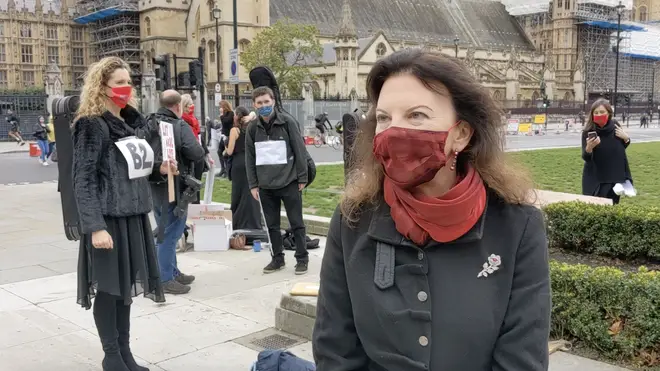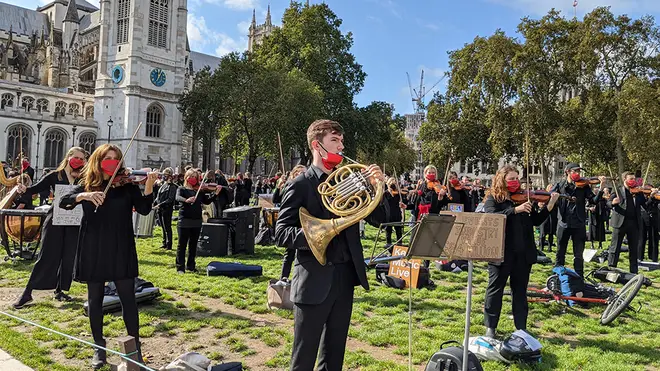On Air Now
Calm Classics with Ritula Shah 10pm - 1am
6 October 2020, 14:31 | Updated: 7 October 2020, 14:42

Let Music Live protest on London's Parliament Square
The British violinist spoke at today’s protest in Parliament Square, where 400 of the UK’s finest musicians took out their instruments in an impassioned plea for live music.
British violinist Tasmin Little has warned of a “cultural desert” in the UK, if freelance artists do not receive targeted financial support from the government.
“We’ve all spent years and years investing in our music-making, so that we can provide – at the drop of a hat – all sorts of creative, wonderful, musical ventures,” Little told Classic FM. “If you cut that off, it will take years to get back – if we ever can – to the level we have enjoyed in this country.”
The virtuoso spoke on 6 October at an organised musical protest in London’s Parliament Square, called Let Music Live. 400 socially-distanced musicians played through a fifth of ‘Mars’ from Holst’s The Planets, representing the maximum 20 per cent support that freelancers receive from the government through the Self-Employment Income Support Scheme (SEISS) grant.
They then stood in silence for two minutes in recognition of the 45 per cent of musicians currently not covered by the SEISS grant, organisers said.
“We are surrounded by some of the most important musicians in our country,” Little said before the performance. “These are the players who provide the soundtrack for your favourite Netflix series. They’re also the people who play in our West End theatres. These people represent not just musicians – they represent a whole entertainment sector.”
Read more: Nearly half of UK musicians forced to quit industry amid coronavirus crisis >

Anger has been mounting in the music industry at the suggestion that arts jobs are not “viable”.
Chancellor Rishi Sunak’s most recent wage top-up scheme, aimed at “protecting as many viable jobs” as possible, can only be claimed by employees working a third of their usual hours. So, industries like theatre and live music that are still in shutdown or are unable to employ workers over the coming months, won’t receive any support.
Scottish violinist and music education advocate Nicola Benedetti, who attended the protest, described the statement as “utterly embarrassing”.
“We are numb to the possibility of not having the beauty of sound and of expression, and having our imagination and hope lifted,” she said. “We’ve forgotten what that’s like, because we’re so used to having incredible music all around us, all the time. If that all went quiet for a day, we would understand what we’re missing.”
400 freelancers gathered today in parliament square, to state their case. (Safely). Their discipline & the sound created brought tears. They are viable & visible and desperate to safely get back to work! work with them #freelancers #letmusiclive @letmusicliveuk #mars https://t.co/YgeTj7KpZY
— Nicola Benedetti (@NickyBenedetti) October 6, 2020
Dave Webster, national organiser for live performance for the Musicians’ Union, which represents 32,000 musicians across the UK, described the UK’s music industry as “world-renowned”, adding it “breaks my heart” to see it crumbling.
“Each one of these musicians, as a business, are completely viable. And yet they’ve fallen between the cracks of government schemes, they can’t get back into the venues because of social distancing, it’s uneconomical for venues to open, so they need help to get back to work, to doing what they do best.”
While concert halls and theatres in England have officially been allowed to reopen for reduced audiences since August, it has been financially impossible for many venues to do so, as they would be operating at a loss.

The arts and culture industries contribute £10.8 billion a year directly to the UK economy, a statistic seen plastered across banners and instrument cases during the Parliament Square performance.
But Webster also spoke of music’s power to enrich our lives – especially during a global pandemic. “Without music, we live in a much, much poorer world,” he said.
“Every aspect of our life is enhanced, nuanced by music. Whether it’s a film soundtrack, you’re going to a concert, a musical theatre, a gig, a pub band, music lifts our spirits. It makes us feel better.”
Dave Hill, who conducted the performance, highlighted music’s role to help us out of dark times.
“The arts are critical as our society rebuilds itself, coming out of COVID. The arts are part of our backbone as a culture. We must look to the arts to be able to help us out of all of this, particularly in terms of our mental health. We need music.”

A stark 83 percent of musicians are facing financial hardship this autumn and winter, according to a Musicians’ Union survey.
Little and Benedetti warned that if arts jobs aren’t supported now, as an entire country we will lose out. “The UK’s already being left behind,” Little said.
Benedetti added: “I speak to people all the time who are doing jobs that have nothing to do with music.”
The MU’s General Secretary, Horace Trubridge, has previously spoken of musicians he knows working in supermarkets, as Deliveroo drivers and hospital staff, as they are forced to pursue more lucrative avenues of work in the absence of concert bookings.
Trubridge said: “We appreciate all the Government has done to support our members through the furlough and self-employment income support schemes so far, but they must not abandon musicians now. We strongly urge the Government to recognise the unique situation that our members are in, and to provide sector specific financial support for musicians.”
In response, a spokesperson for the Department for Digital, Culture, Media and Sport (DCMS) said: “Covid has had a devastating impact on our brilliant performing arts and we understand this is a really anxious time for the creative industries. That’s why we are investing £1.57 billion to save the arts, building on an additional £200 million from Arts Council England, and the tens of millions of pounds from the Government’s support schemes. The Self Employed Scheme has been a lifeline to two thirds of cultural freelancers, and the best way to help more freelancers is to create work by getting more production and performances back on safely. We are working flat out across Government to help the arts through Covid.”
The promised £1.57bn emergency arts fund for venues has recently been hit by a week’s delay. The Arts Council apologised for the delay, citing “volume and complexity of the applications”.
The ensemble was joined in solidarity by The Incorporated Society of Musicians, The Musicians’ Answering Service, Jools Holland, Sophie Ellis-Bextor and more. The event was COVID-safe, adhering strictly to social distancing regulations, the organisers confirmed.